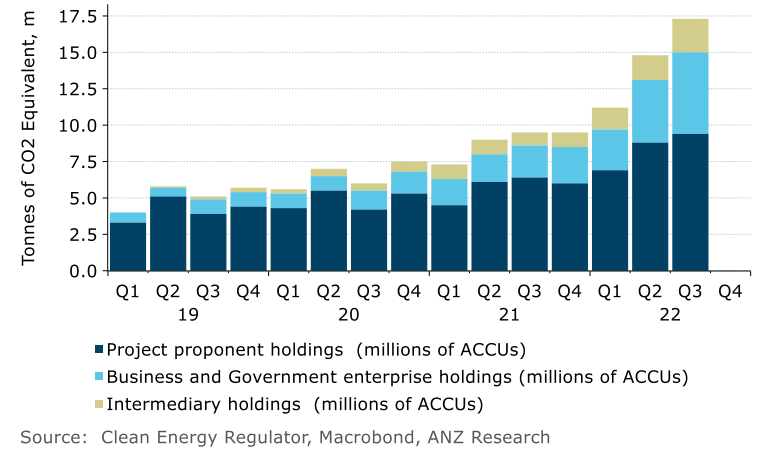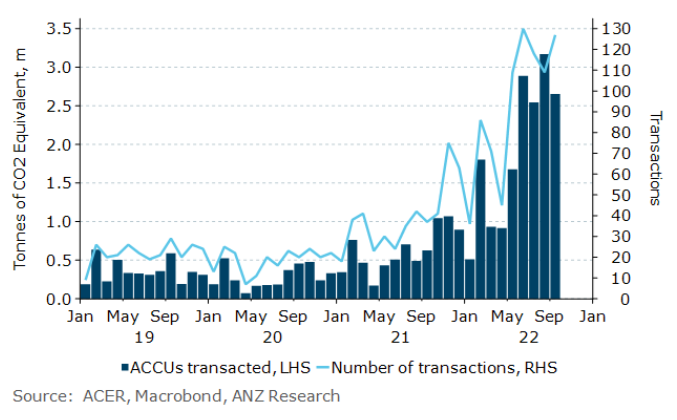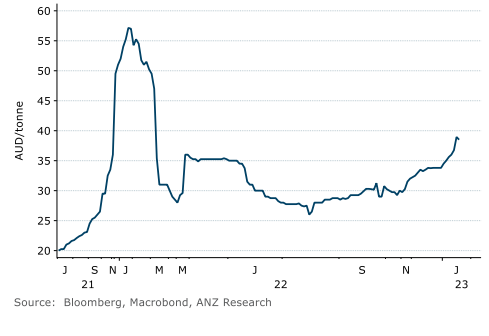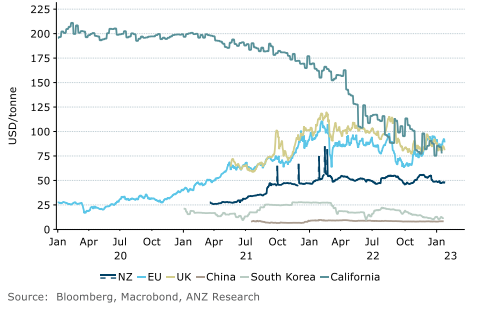-
Australia’s carbon market is on the precipice of its most important stage of development.
Proposed changes to regulations should bring legitimacy to the market. The tightening of greenhouse gas emission targets should see demand surge in coming years and subsequent price signals should spur meaningful de-carbonisation over the next decade.
"“Climateworks Centre, a non-profit organisation, calculates about half of Australia’s biggest listed companies have plans to reach net-zero emissions.”
Since it was first created in 2014, the Australian carbon market has lacked effective price signals. Lenient emissions baselines and generous free allocation of allowances have failed to provide strong enough incentives for market participants to reduce emissions.
That all looks to be changing following a recent review by the Federal government.
The resetting of the emissions targets under the safeguard mechanism is likely to see a surge in demand for Australian carbon credit units (ACCU). This will spur investment in offset projects.
However, with the lag to investment sometimes taking years, there will be increasing demand for government issued ACCUs. This is likely to exert upward pressure on prices for the foreseeable future.
ACCU transactions likely to grow rapidly following reforms
{CF_IMAGE}
Year Ahead
The Australian carbon market has struggled to gain legitimacy because of lenient emissions targets and question marks over carbon credits.
For any market to function, there needs to be confidence in delivery of contracts. In the case of ACCUs, this extends to both the validity and integrity of the underlying methodologies used to generate the units and the actual performance of projects.
There has also been criticism the market was ineffective in driving emissions down. The relatively high baseline targets created little incentive to find solutions.
This has held back the growth and development of the ACCU market and has been reflected in the low volume of transactions.
Holdings of Australian carbon credit units were relatively stagnant until recently. Total holdings pushed above 10 million tonnes of carbon dioxide equivalent (CO2e) in early 2022. However, the increasing involvement of investors amid a surge of interest in the market sharply lifted volumes over the past year.
ACCU holdings

ACCU market volumes and transactions

Review
Recommendations from a recent review have set the stage for the existing carbon market to now develop into an effective tool for reducing emissions and meeting Australia’s net-zero emissions targets. An independent panel, chaired by Professor Ian Chubb, found the scheme was fundamentally well-designed when introduced.
Nevertheless, it recommended several changes that should make it significantly more effective, including:
• clarifying governance
• improving transparency
• facilitating positive project outcomes and co-benefits, and
• enhancing confidence in the integrity and effectiveness of the scheme.
The most important recommendation is the tightening of the rules to eliminate future “avoided deforestation” projects from eligibility.
A lack of transparency had led to scepticism in the ACCU market, a headwind for its growth and development. Credits for certain projects, such as landfill gas used to reduce methane emissions, will likely become stricter.
The review also recommended tougher oversight of human-induced regeneration (HIR). This should address criticisms these activities do not represent real and additional abatement. Some have raised concerns these recommendations will markedly reduce ACCU supply.
However, we see the proposals making it ultimately easier to establish new and bespoke ACCU-generating projects. It’s the recommended changes to the safeguard mechanism that are likely to have the biggest impact on the market.
Impact
We believe the changes will align industry emissions baselines with net-zero emissions by 2050.
This comes amid the rising adoption of net-zero commitments. Climateworks Centre, a non-profit organisation, calculates about half of Australia’s biggest listed companies have plans to reach net-zero emissions. They analysed 187 companies listed on the ASX200, which produce 32 per cent of Australia’s operational emissions.
That has shifted sharply over the past year. In November2022, 23 of Australia’s largest companies had all emissions aligned to under 1.5°Cnet-zero targets. This represents a 44 per cent increase since March. There was a 40 per cent increase in indirect emissions (Scope 3) net-zero targets, while 20 to 30 per cent more companies had interim targets.
Australia has also joined with more than 10 global partners, including the US, to launch the world's first Net Zero Government Initiative at COP27. Not only will the new guidelines accelerate decarbonisation but they will also significantly add to ACCU demand.
ACCU spot price

Global carbon prices

Demand
In Australia, investor demand has been increasing steadily since 2019. However, interest ramped up significantly in 2022.
The September quarter 2022 saw a record amount of ACCU purchased by intermediaries (or investors). Approximately 600kt of ACCUs were added, bringing their total holdings to just over 2.25mt. After making up less than 1 per cent of the market in 2019, total holdings by investors have now increased to more than 13 per cent. Considering the surge in energy prices has been a big part of rising inflation, we expect investors to use the sector as a natural hedge.
Overall, we see significant upside for ACCU prices. The growing demand for carbon offset both from emitters and investors should drive up prices over the coming year.
ACCUs are trading at AUD38/t, up sharply since the reforms were announced earlier this month. The increased interest in the market could see the impact of the reforms being priced-in before they become effective in July 2023.
Nevertheless, we see upside over the medium term. At USD27/t, the ACCU spot price is well below global comparable carbon price benchmarks. In addition, recent abatement cost analysis by the CSIRO highlights an ACCU price of around USD68/t is required to stimulate investment in Australian carbon capture projects.
Registered clients can find the full report here.
Daniel Hynes is Senior Commodity Strategist and Soni Kumari is Commodity Strategist at ANZ Institutional
The views and opinions expressed in this communication are those of the author and may not necessarily state or reflect those of ANZ.
-
Carbon markets evolving, demand to grow
2023-01-31
/content/dam/anzcomau/bluenotes/images/articles/2023/February/Screenshot%202023-01-31%20at%204.53.20%20pm.png
EDITOR'S PICKS
-
Inflation and conflict have roiled commodity markets. What does it mean for investors? ANZ’s commodities strategist Daniel Hynes explains.
25 August 2022 -
As more carbon credits become tokenised within a blockchain they’ll become more accessible and more easily traded, with significant benefits for emissions reduction efforts.
1 August 2022

